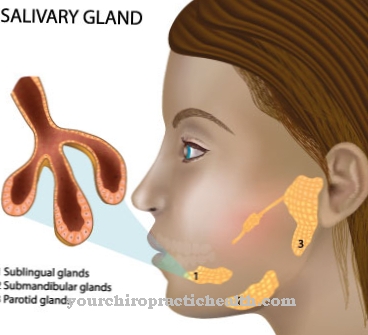Mood disorders are widespread in the population. The multiple symptoms can occur in practically all organ systems, which often complicates the assignment to certain clinical pictures and a clear diagnosis. Mood disorders without objective organic findings have no disease value in medicine.
What is a disorder?
Mood disorders, also as functional dysfunction appear at every age. Even small children and schoolchildren complain of mental disorders. On the one hand, the symptoms are very common in general medical practice, on the other hand, the large number of complaints are often difficult to classify, which sometimes leads to a large number of doctor visits for those affected.
Typically, the collection of a large number of borderline findings with physical examinations, blood tests or imaging tests, without ultimately being able to find a medical explanation for the symptoms. This is why functional disorders or mental disorders are also very important economically, because they occur very frequently and cause enormous costs to the health system.
The transition from mental disorders to so-called somatoform disorders is fluid. In almost all cases, however, the patients suffer from vegetative instability combined with a misguided body perception. These psycho-vegetative complaints should be treated despite the lack of a clear cause so that they do not become chronic.
causes
The exact causes of mental disorders that turn out to be vegetative lability or as vegetative dystonia express are not known to this day. It is assumed, however, that the complex interplay of body, mind and soul leads to an imbalance in any disorder.
In psychiatry today it is assumed that every so-called functional disorder is entertained and triggered by unresolved, internal conflicts. The symptoms of a disorder would be nothing more than an inadequate attempt at coping on a somatic, i.e. physical level. Mood disorders of any kind are therefore always psychosomatic; if no diagnosis is made despite multiple visits to the doctor, the doctor-patient relationship will suffer considerably over time.
Patients with such disorders are not simulators, but experience the symptoms for real. Chronic somatized disorders should also be thoroughly examined psychiatrically. It is not uncommon for the causes to be found in the direct social environment of an affected person. In specialist circles, it has also been discussed for a long time whether hereditary components must also be taken into account in the development of mental disorders.
You can find your medication here
➔ Medicines to calm down and strengthen nervesSymptoms, ailments & signs
The complaints from which those affected suffer are extraordinarily diverse and difficult to classify. First of all, it is important that the attending physician takes all complaints seriously despite the lack of organic findings. The patient must not have the feeling that nothing concrete can be done just because nothing concrete has been found.
The character of the suffering corresponds to unspecific general symptoms and therefore raises diagnostic and therapeutic problems accordingly. The main age of people with mental disorders is 20 to around 40 years, in older age the number of patients decreases significantly, but the reasons for this are unknown. Typical complaints and signs of mental disorders are always emotional or unspecific physical.
Specifically, this can express itself as listlessness, general malaise, breathing problems, urgency to urinate, feeling of pressure on the chest or the feeling as if there was a lump in the throat. Muscle tension, headaches, joint problems and itchy skin are also frequently described.
Those affected also report an increased incidence of indecision or a decrease in concentration with forgetfulness. Since most symptoms of a functional disorder can also reflect an organic condition, a careful differential diagnosis is so important.
Diagnosis & course
The most important diagnostic criterion for any kind of disorders is the intensive consultation with a doctor. Based on the descriptions of the patient and the collection of objective findings by means of blood tests, EKG, X-rays or functional tests, it quickly becomes clear that there is no organic disease.
Typical embarrassment diagnoses, as they are then made in the doctor's office, are, for example, vegetative dystonia, functional disorder, masked depression, multiple complaint syndrome or psycho-vegetative exhaustion. The course of the disease is often chronic with a tendency to worsen, with the psychological resilience and physical performance decreasing more and more.
Complications
Mood disorders cover a broad spectrum, with the transition to illnesses being fluid. As a result, a disorder usually has the potential to exacerbate into a clinical manifestation. For example, the depressive mood can develop into a fully developed (major) depression without treatment and without self-help.
If the depressive mood continues for a long time without reaching the severity of a depressive episode, dysthymia can also be considered as a diagnosis. The same applies to physical disorders. They can precede or occur as a result of physical illnesses.
Most social disorders have no diagnostic equivalent. However, a social disorder can contribute to psychological stress and accordingly be reflected in either a physical or a psychological disorder. Social stress and bullying, for example, often lead to depression, anxiety disorders or somatic disorders.
Stress also affects the body and can cause or promote organic diseases. If a disorder has not yet crossed the threshold of illness, treatment is often difficult. In order to avoid complications and deterioration, preventive measures are useful.
This includes personal mental hygiene and careful handling of your own body. In addition, the statutory health insurance companies in Germany offer various preventive services such as relaxation courses, nutritional advice or stress management.
When should you go to the doctor?
Persistent physical complaints should always be checked by a doctor - even if they are only mild. However, it is difficult to set a specific time limit. In the case of episodically recurring mood disorders, a visit to the doctor is often also useful, even if the symptoms repeatedly disappear in the meantime.
Patients with severe symptoms should not delay a visit to the doctor too long. There may be a specific cause of the symptoms and rapid treatment may be required.
Diagnostic work-up is also useful in the case of mental disorders. Cognitive, emotional or behavioral symptoms can not only indicate a mental disorder or a mental disorder, but can also occur in the context of a physical illness. For this reason, those affected can first visit their family doctor or a general practitioner to find out a possible physical cause.
Both physical and mental disorders are not always diagnosable diseases.
If no organic reason for the mental disorder can be found, a visit to a psychotherapist or psychiatrist may be informative. Diagnosis is particularly advisable if the psychological symptoms appear for a longer period (for example, for two weeks) or are also very pronounced.
Somatoform disorders can also be treated with psychotherapy. The recommendation of psychological or psychotherapeutic treatment does not mean that a simulation of the symptoms is assumed.
Doctors & therapists in your area
Treatment & Therapy
A causal, i.e. cause-related therapy, is not possible due to the complexity of the symptoms and the lack of objective physical findings. The long-term consequences of a functional disorder are serious from a psychosomatic point of view, so therapy should definitely be given, also in order to alleviate the often considerable suffering of those affected. However, timely prevention has proven to be the best therapy for mental disorders.
A person with psychosomatic disorders is neither mentally ill in the classical sense, nor does he suffer from psychosis, neurosis or hypochondria. Because a mental repression problem is obvious as the main cause of mental disorders, certain methods of psychotherapy are suitable for long-term improvement of the symptoms.
In particular, conversation psychotherapy over a longer period of time, depth psychological methods and behavioral therapies have proven themselves. Mood disorders that have not been treated for years or decades can also lead to manifest depression.
Outlook & forecast
Depending on the type of impairment, the prognosis is very different. A mood disorder can last for a very long time and persist for several months or years. However, it can also only be temporary. Studies on the prognosis of mental disorders are difficult to compare, as the results depend on the exact definition.
Both an improvement and a worsening of the symptoms are conceivable in the medium and long term. In addition, there is the possibility that the disorder will remain the same. Even in individual cases, a clear prognosis cannot always be determined. The complaints can change both in their nature and in their intensity.
A mood disorder does not always have to be treated by a doctor. In some cases, it subsides without external intervention or improves through general stress-reducing measures and simple home remedies.However, a disorder can also develop into another disease. For example, many infectious diseases start with a general feeling of malaise before the specific symptoms of the disease develop.
If a disorder persists over a longer period of time, a detailed investigation is often advisable. This also applies to psychological complaints, as some psychological disorders can be very inconspicuous. This includes, for example, dysthymia. It is characterized by a chronic depressive mood that lasts for at least two years. The transition between a disorder and other illnesses can accordingly be fluid.
You can find your medication here
➔ Medicines to calm down and strengthen nervesprevention
There is a lot that everyone can do in an active lifestyle to avoid somatoform disorders in the first place. A healthy social environment with plenty of pronunciation options already offers some protection. The general well-being can also be influenced with the diet, stimulants like nicotine and alcohol should be avoided.
Physical measures such as a sauna, alternate showers or dry brushing have also proven helpful for prevention. So-called psychagogic therapy concepts promise new approaches to the prevention of mental disorders, which are a synthesis of pedagogical instructions for everyday life and psychotherapy.
Aftercare
In the case of disorders, follow-up care is the same as prevention. Since disorders of well-being can relate to very different organic and psychological complaints, the focus here is on general aftercare options. There are three core areas of health promotion that can be useful in the follow-up care of mental disorders.
A healthy diet contributes to physical and mental well-being and can help prevent future illnesses and disorders. This does not only apply to ailments that are clearly caused by malnutrition. Food provides the body with the basis for all metabolic processes and is therefore very important.
Proper amount of exercise also improves health. The movement should be adapted to personal strengths and weaknesses. Concrete agreements with the doctor, a physiotherapist or a qualified health trainer are useful here. Reducing stress is the third pillar of health promotion. Stress reduction is particularly important in the follow-up care of psychological disorders such as depressive moods in order to prevent the symptoms from returning.
However, mental stress can also affect physical health. In most cases, disturbances of well-being are only mildly pronounced, which is why follow-up care flows smoothly into a healthy everyday life. Long-term lifestyle changes in diet, exercise and dealing with stress make sense in many cases.
You can do that yourself
A disorder should be diagnosed and treated by a doctor or therapist. In addition to conventional medical and therapeutic measures, psychosomatic disorders can be alleviated through various self-help measures.
Depending on the cause, changing your lifestyle can help. Mood swings and psychological pain can at least be reduced through exercise and a healthy, balanced diet. A change of environment or moving to a new place of residence can also alleviate the various complaints that are associated with a disorder.
For this, however, it is necessary that those affected clearly recognize their disorder as such. A complaint diary helps to record and analyze your own mood and daily constitution. Conversations with friends and family also support self-diagnosis.
An important step in the treatment of mental disorders is the resolution of inner conflicts. This is possible both in self-help groups and in psychological counseling sessions. In the long term, the psychosomatic triggers must be medically clarified and treated. Through psychological counseling on the one hand and an increase in quality of life on the other hand, dealing with a disorder can be made considerably easier.

.jpg)


.jpg)
.jpg)


















.jpg)



